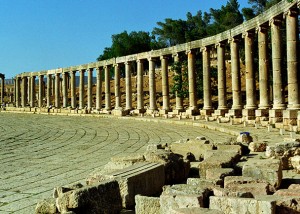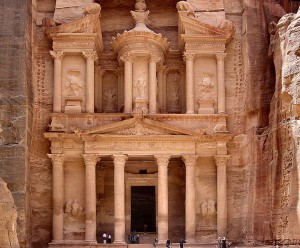Jordan is an Arab kingdom in Western Asia, on the East Bank of the Jordan River, and extending into the historic region of Palestine. Jordan borders Saudi Arabia to the south and east, Iraq to the north-east, Syria to the north, and Palestine, the Dead Sea and Israel to the west.
The kingdom emerged from the post-World War I division of West Asia by Britain and France. In 1946, Jordan became an independent sovereign state officially known as the Hashemite Kingdom of Transjordan. After capturing the West Bank during the 1948 Arab–Israeli War, Abdullah I took the title King of Jordan and Palestine. The name of the state was changed to The Hashemite Kingdom of Jordan on 1 December 1948.
Although Jordan is a constitutional monarchy, the king holds wide executive and legislative powers. Jordan is classified as a country of “medium human development” by the 2011 Human Development Report, and an emerging market with the third freest economy in West Asia and North Africa (32nd freest worldwide). Jordan has an “upper middle income” economy. Jordan has enjoyed “advanced status” with the European Union since December 2010,[12] and it is a member of the Euro-Mediterranean free trade area. It is also a founding member of the Arab League and the Organisation of Islamic Cooperation (OIC).

The Roman Oval Piazza in the ancient city of Jerash
In antiquity, the present day Jordan became a home for several Semitic Canaanite-speaking ancient kingdoms, including the kingdom of Edom, the kingdom of Moab, the kingdom of Ammon, the kingdom of Israel and also the Amalekites. Throughout different eras of history, the region and its nations were subject to the control of powerful foreign empires; including the Akkadian Empire (2335-2193 BC), Ancient Egypt (15th to 13th centuries BC), Hittite Empire (14th and 13th centuries BC), the Middle Assyrian Empire (1365-1020 BC), Neo-Assyrian Empire (911-605 BC), the Neo-Babylonian Empire (604-539 BC) and the Achaemenid Empire (539-332 BC) and, for discrete periods of times, by Israelites. The Mesha Stele recorded the glory of the King of Moab and the victories over the Israelites and other nations. The Ammon and Moab kingdoms are mentioned in ancient maps, Near Eastern documents, ancient Greco-Roman artifacts, and Christian and Jewish religious scriptures.

Petra, one of the New Seven Wonders of the World
Tourism accounted for 10%–12% of the country’s Gross National Product in 2006. In 2010, there were 8 million visitors to Jordan. The result was $3.4 billion in tourism revenues, $4.4 billion if medical tourists are included. Jordan offers everything from world-class historical and cultural sites like Petra and Jerash to modern entertainment in urban areas most notably Amman. Moreover, seaside recreation is present in Aqaba and Dead Sea through numerous international resorts. Eco-tourists have numerous nature reserves to choose from as like Dana Nature Reserve. Religious tourists visit Mt. Nebo, the Baptist Site, and the mosaic city of Madaba.
Jordan has nightclubs, discothèques and bars in Amman, Irbid, Aqaba, and many 4 and 5-star hotels. Furthermore, beach clubs are also offered at the Dead Sea and Aqaba. Jordan played host to the Petra Prana Festival in 2007 which celebrated Petra’s win as one of the New Seven Wonders of the World with world-renowned DJs like Tiesto and Sarah Main. The annual Distant Heat festival in Wadi Rum and Aqaba ranked as one of the world’s top 10 raves.